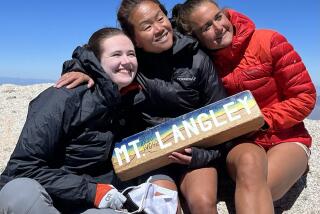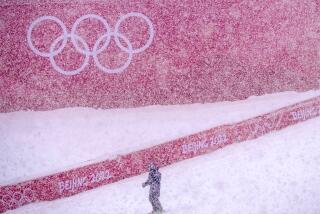Packed Powder Keg?
- Share via
The top two beeliners on the United States women’s Alpine skiing squad get along better than they used to, but that doesn’t mean they’re about to open a ski boutique.
In fact, thermal dynamics can become a complicating factor in being part of an Olympic ski “team.”
Lindsey Kildow and Julia Mancuso have been trying to knock each other’s block off since their tow-rope days, yet now they’re supposed to come together for the common good?
“You know,” Kildow said, “it’s really hard being compared to someone your entire life. I’m sure she feels the same.”
Kildow and Mancuso represent the best women’s hopes for United States Alpine medals at the Turin Olympics.
Both are 21, billboard beautiful, fiercely competitive and completely different.
What they are not: best friends -- although they’re working on it, witness that all-smiles pose they shared recently after sharing a World Cup podium at Cortina, Italy.
Mancuso finished second in that super-giant slalom, with Kildow third, and it seemed the perfect opportunity to defuse a long-standing coolness.
“On the road, we try to request bunk beds everywhere we go,” Mancuso quipped to the international press.
In fact, getting lumped together for the sake of America is simply part of the gondola ride.
You can try to go it alone on the ski circuit -- good luck and here’s hoping your dad is rich. No, the only real way for an American to reach his or her goals in skiing is to have training, lodging, incidentals and sports psychology subsidized by the United States Ski and Snowboard Assn.
This entails becoming part of a “team” that travels in close quarters for four months on the World Cup circuit in Europe.
It’s almost like a lab experiment.
“Boiling points, man,” Kildow explained.
The person you’re trying to beat out for the top prize, the person you’ve been compared to all your life, is sitting next to you in the van at Cortina, at the dinner table in St. Moritz and at team meetings in Lenzerheide.
“We were born in the same year, we’ve been around the same time,” Mancuso says of her time-share experience with Kildow.
A decade ago, Picabo Street and Hilary Lindh were the top two American female skiers and, for the record, they went months without passing the salt to each other.
The duo was dubbed “fire” and “ice” and yet they managed to win because of and, you could argue, in spite of each other.
“Honestly, it’s one of the hardest dynamics,” Street recounted recently. “That’s all part of something I would love to document one day: preparing as a team and winning as an individual. It’s such an oxymoron and what a warped sense of psychology. It really, really is. You’re asking a lot of these young girls.”
Street’s personality was a five-alarm fire compared to the contemplative Lindh, and it often caused friction.
The ski team could describe this as a paradigm of competitive tension -- and close-quarters combat does have its merits.
“I think that’s one of our strengths as a team, we spend so much time together,” U.S. women’s Coach Patrick Riml explained.
Lindh struck first when she took second in the downhill at the 1992 Albertville Games. Street answered two years later with her own downhill silver at Lillehammer, then took the gold in super-G in 1998.
Street so overshadowed Lindh on the platform that it was almost lost in the news when Lindh retired in 1997, after winning the world championship in the downhill.
In the modern remake, Mancuso gets pigeonholed into the Picabo role, and Kildow is Lindh -- although it’s more complicated than that.
Kildow, in fact, tends to confide in Street.
Mancuso is free-spirited like Street, though, more outspoken and unpredictable, yet she recoils at the direction these inquiries take.
“I don’t think I’m high maintenance,” Mancuso said. “I try to be easygoing. I don’t know if I’d really want that comparison. I don’t really see the connection.”
Mancuso still sounds bothered by being, to her recollection, the only ski-team member who didn’t receive a Christmas present from Street before the 2002 Salt Lake Games.
“I was 16,” Mancuso said. “Maybe that’s why she didn’t like me, because I didn’t take to her as an idol.”
Kildow fits more comfortably into the Lindh role.
“I’m just more reserved,” Kildow said of the differences between her and Mancuso. “It’s hard to explain. We’re just different. ... She is kind of like a hippie sometimes. I’m definitely not a hippie.”
Just like Picabo and Hilary?
“It’s almost exactly the same,” Kildow said. “Actually, the best comparison is Daron [Rahlves] and Bode [Miller]. I’m Daron and she’s Bode.”
Ouch?
Kildow and Mancuso have been going at it for years -- and their relationship has gone sweet and sour.
“We were pretty good friends ... one year,” Mancuso said earlier this season.
Mancuso came of age in Squaw Valley, Calif.; Kildow at Erich Sailer’s renowned Buck Hill ski program in Minnesota.
Mancuso remembers being the hotshot junior from the West and meeting her equal in the “child prodigy,” Kildow, from the Midwest.
“When you’re racing someone your same age and they start beating you, it’s like, ‘What can I do to be better?’ ” Mancuso said of her ongoing competition with Kildow. “I think in that way, we’ve really helped push each other.”
The two raced all the way to favored-status spots on the U.S. ski team and, as teenagers, provided a glimpse of the future at the 2002 Games when Kildow finished sixth in the combined to Mancuso’s 13th.
Mancuso and Kildow followed by winning U.S. championships in 2003.
The race was on.
Kildow made the first leap last year when she won her first World Cup event, a downhill, at Lake Louise in Canada.
However, at last year’s world championships in Bormio, Italy, Mancuso stole the snow by winning two bronze medals -- in super-G and giant slalom.
Kildow managed two fourth-place finishes -- in the downhill and the combined events.
“Fourth,” Kildow recounted disgustedly, “the first loser.”
As the Turin Games approached, Kildow reclaimed the upper hand in the rivalry, winning her second and third World Cup downhills this season while Mancuso tried to adjust to new boots.
Mancuso finally answered with second-place finishes in consecutive World Cup races in late January.
As far as lingering bitterness goes, these things tend to sort themselves out -- especially when you are up on a podium together in Cortina.
Even Street and Lindh made peace late in their careers.
In a strange way, Street says, Kildow and Mancuso will get better results as they learn to get along.
“I’m trying to encourage them to work together to accomplish even more,” Street said. “Because, separately, they’re going to win less than together.”
The ski team has tried to do a better job of allowing Kildow and Mancuso their space.
“They’re competitive, everyone wants to win,” said Riml, the women’s Alpine coach. “But they’re very professional. You try to get everyone some privacy.”
One difference between Kildow and Mancuso is the way they view their relationship.
“Personally, I’ve never looked at is as a rivalry,” Mancuso said. “I’ve never had rivals. I’m not that type.... [Kildow] may not know it, but the more she rivals me, the more it helps me, because I’m able to take that energy.”
Kildow, though, remembers the chill dropping below freezing at times.
“I think it was mostly me,” she confessed.
Kildow once took Mancuso’s brashness too personally but the skiers are working on it.
“Our personalities are definitely not suited for one another,” Kildow said. “But there’s definitely a professional aspect you have to consider. You have to get over it. We’ve definitely gotten over it.”
Kildow admits it’s sometimes difficult being a team player in a sport so personal.
“It’s really strange, skiing,” Kildow said, before adding with a grin, “I think it would be kind of fun to be a tennis player.”
More to Read
Go beyond the scoreboard
Get the latest on L.A.'s teams in the daily Sports Report newsletter.
You may occasionally receive promotional content from the Los Angeles Times.







